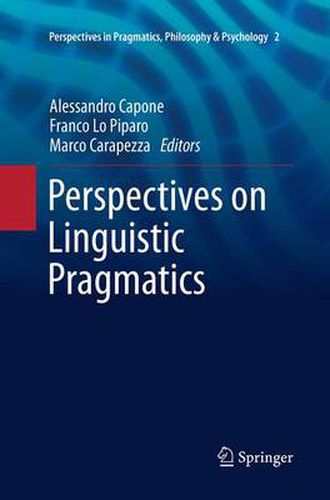Readings Newsletter
Become a Readings Member to make your shopping experience even easier.
Sign in or sign up for free!
You’re not far away from qualifying for FREE standard shipping within Australia
You’ve qualified for FREE standard shipping within Australia
The cart is loading…






This title is printed to order. This book may have been self-published. If so, we cannot guarantee the quality of the content. In the main most books will have gone through the editing process however some may not. We therefore suggest that you be aware of this before ordering this book. If in doubt check either the author or publisher’s details as we are unable to accept any returns unless they are faulty. Please contact us if you have any questions.
This volume provides insight into linguistic pragmatics from the perspective of linguists who have been influenced by philosophy. Theory of Mind and perspectives on point of view are presented along with other topics including: semantics vs. semiotics, clinical pragmatics, explicatures, cancellability of explicatures, interactive language use, reference, common ground, presupposition, definiteness, logophoricity and point of view in connection with pragmatic inference, pragmemes and language games, pragmatics and artificial languages, the mechanism of the form/content correlation from a pragmatic point of view, amongst other issues relating to language use. Relevance Theory is introduced as an important framework, allowing readers to familiarize themselves with technical details and linguistic terminology.
This book follows on from the first volume: both contain the work of world renowned experts who discuss theories relevant to pragmatics. Here, the relationship between semantics and pragmatics is explored: conversational explicatures are a way to bridge the gap in semantics between underdetermined logical forms and full propositional content.
These volumes are written in an accessible way and work well both as a stimulus to further research and as a guide to less experienced researchers and students who would like to know more about this vast, complex, and difficult field of inquiry.
$9.00 standard shipping within Australia
FREE standard shipping within Australia for orders over $100.00
Express & International shipping calculated at checkout
This title is printed to order. This book may have been self-published. If so, we cannot guarantee the quality of the content. In the main most books will have gone through the editing process however some may not. We therefore suggest that you be aware of this before ordering this book. If in doubt check either the author or publisher’s details as we are unable to accept any returns unless they are faulty. Please contact us if you have any questions.
This volume provides insight into linguistic pragmatics from the perspective of linguists who have been influenced by philosophy. Theory of Mind and perspectives on point of view are presented along with other topics including: semantics vs. semiotics, clinical pragmatics, explicatures, cancellability of explicatures, interactive language use, reference, common ground, presupposition, definiteness, logophoricity and point of view in connection with pragmatic inference, pragmemes and language games, pragmatics and artificial languages, the mechanism of the form/content correlation from a pragmatic point of view, amongst other issues relating to language use. Relevance Theory is introduced as an important framework, allowing readers to familiarize themselves with technical details and linguistic terminology.
This book follows on from the first volume: both contain the work of world renowned experts who discuss theories relevant to pragmatics. Here, the relationship between semantics and pragmatics is explored: conversational explicatures are a way to bridge the gap in semantics between underdetermined logical forms and full propositional content.
These volumes are written in an accessible way and work well both as a stimulus to further research and as a guide to less experienced researchers and students who would like to know more about this vast, complex, and difficult field of inquiry.